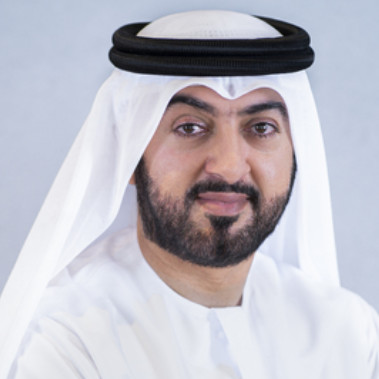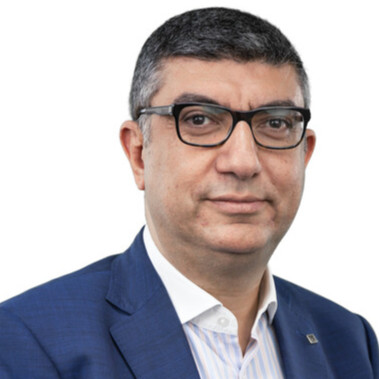المركز الاعلامي المركز الاعلامي
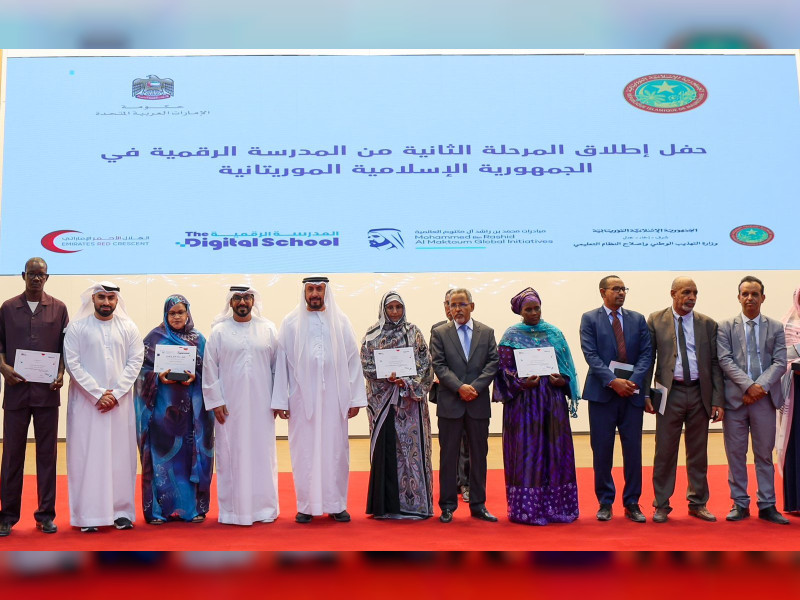
Digital School inaugurates 66 new digital learning centres, targeting 100,000 students and 1,000 teachers in Mauritania
المدرسة الرقمية تفتتح 66 مركزاً جديداً للتعلم الرقمي تستهدف 100 ألف طالب وألف معلم في موريتانيا.
The Digital School, one of Mohammed bin Rashid Al Maktoum Global Initiatives, has inaugurated 66 new digital learning centres in the Islamic Republic of Mauritania.
These centres were established in collaboration with the Emirates Red Crescent (ERC) as part of the Digital School’s initiatives aimed at disseminating digital education skills and solutions in the Arab region.
The launch came in line with the second phase of the Digital School’s initiative in the Islamic Republic of Mauritania during an official visit by a delegation from the Digital School, including Hamoud Al Junaibi, Deputy Secretary-General of ERC, along with Dr. Waleed Al Ali, Secretary-General of The Digital School.
The visit is conducted in collaboration with the Ministry of National Education and Educational Reform in Mauritania. Its aim is to observe the progress of The Digital School’s initiatives in Mauritania and enhance its role in attracting 100,000 students and training 1,000 teachers to benefit from The Digital School programmes.
The visit includes meetings with government officials and strategic partners to discuss ways of supporting The Digital School’s initiatives and ensuring their success. Additionally, the delegation is conducting a field visit to observe the progress of digital learning centres and learn about the experiences of teachers and students with The Digital School.
Omar bin Sultan Al Olama, Minister of State for Artificial Intelligence, Digital Economy, and Remote Work Applications, Chairman of the Board of Directors of The Digital School, emphasised that The Digital School is a reflection to the vision of His Highness Sheikh Mohammed bin Rashid Al Maktoum, Vice President, Prime Minister and Ruler of Dubai, for the future of education and the upcoming generation of the educational system which will be in anchored in technological and digital solutions. It embodies his aspirations to actively contribute to building the new generation in the Arab region, empowering them with advanced science and technology to play an effective role in shaping a better future for societies.
Al Olama added that The Digital School represents a profound commitment to shaping the future of education and fostering the next generation of the educational system through the utilisation of technological advancements and digital solutions.
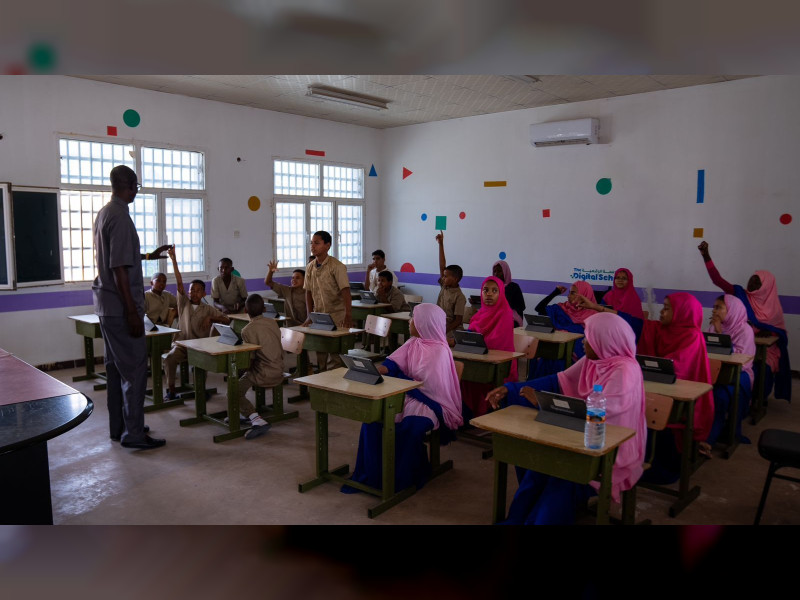
Moreover, Al Olama said that The Digital School embodies His Highness’s directives to actively contribute to the development of new generations in the Arab region, enabling them to embrace the realms of science and advanced technology. This empowerment paves the way for their participation in the creation of a better future for societies at large.
He highlighted the establishment of 66 new digital learning centres in Mauritania as a result of the remarkable achievements witnessed during the first phase, which involved the launch of six digital education centres in collaboration with the Ministry of National Education and Educational Reform in Mauritania. This success was accomplished through the collaboration between The Digital School and the Emirates Red Crescent in training digital teachers, enhancing the digital curriculums, and actively engaging students to participate in the school’s programmes. The objective of this initiative is to foster a positive impact on a substantial scale, targeting the enrollment of 100,000 students and the professional development of 1,000 teachers across Mauritania.
Al Olama praised the Mauritanian government’s dedication to ensuring access to high-quality educational experiences for students across the country. By creating opportunities that empower students to acquire knowledge, develop essential skills, and gain valuable experiences, the government is equipping them with the necessary tools to confront future challenges and assume leadership roles in shaping the future of governments and economies.
Ibrahim Fal Mohammed Al-Amin, the Minister of National Education and Educational Reform in the Islamic Republic of Mauritania, said, “As an embodiment of fruitful cooperation between our country and The Digital School, an agreement was reached to establish The Digital School in Mauritania in 2021. In its initial pilot phase, this project enabled the opening of six equipped digital centres in four middle schools and two primary schools, benefiting 635 students. Twelve teachers were trained in the field of digital education, along with three members of the team. This training culminated in the national team receiving certificates from the University of Arizona, and the distribution of 400 electronic tablets.”
He added, “The project’s second phase aims to expand this experience to include 60 new schools, benefiting 20,000 students in both primary and preparatory stages. It also includes the training of 146 teachers and an increase in the project team members.”
Hamoud Al Junaibi, Deputy Secretary-General of the Emirates Red Crescent, emphasised the organisation’s support for such impactful initiatives that directly benefit developing communities and enhance human and social development. The Emirates Red Crescent attaches great importance to education and providing opportunities for all.
He added, “Our partnership with the Mohammed bin Rashid Al Maktoum Global Initiatives in The Digital School project in Mauritania and other countries aims to facilitate students’ access to advanced digital educational content, encourage learning and knowledge acquisition, overcome challenges, combat school dropout rates, enrich electronic content, and support education that promotes development, stability, progress, and prosperity in communities.”
Al Junaibi stated that the opening of 66 digital school centres in Mauritania is a significant achievement and a progressive step in the ongoing partnership between the Emirates Red Crescent and the Mohammed bin Rashid Al Maktoum Global Initiatives. The goal is to coordinate joint efforts to achieve The Digital School’s objectives and enhance the efforts of both parties to improve the lives of the targeted communities. Innovative and non-traditional solutions are provided to address the challenges faced by human societies, with education being a top priority.
He also elaborated that as part of the partnership between the two sides, the Emirates Red Crescent helps identify targeted areas, ensuring their accessibility, and providing vital support, particularly in villages and remote regions covered by the organisation’s activities. This partnership exemplifies a collaborative, harmonious, and team-oriented model among Emirati institutions operating in the fields of humanitarian and developmental work, and fully committed to empowering the targeted groups with the knowledge and skills needed to enhance their lives in a sustainable manner, overcoming any challenges they may encounter.
The governments of the UAE and Mauritania celebrated the launch of the second phase of The Digital School in Mauritania at an event held at the Conference Palace in Nouakchott. The event was attended by Ibrahim Fal Mohamed Al-Amin, Minister of National Education and Educational Reform, Hamad AlMehairi, Ambassador of the United Arab Emirates in Mauritania, the accompanying delegation, and several senior government officials.
The Digital School initiative was presented during the ceremony, showcasing its achievements in teacher training, digitisation of educational content, and the establishment of digital learning spaces. The event also celebrated the graduation of the first cohort of the Digital Teacher Training Programme, a collaboration between The Digital School, the University of Arizona, and the Ministry of National Education and Educational Reform in Mauritania. Notably, Professor Lammam Hamoud and a group of distinguished teachers from The Digital School in Mauritania were honored.
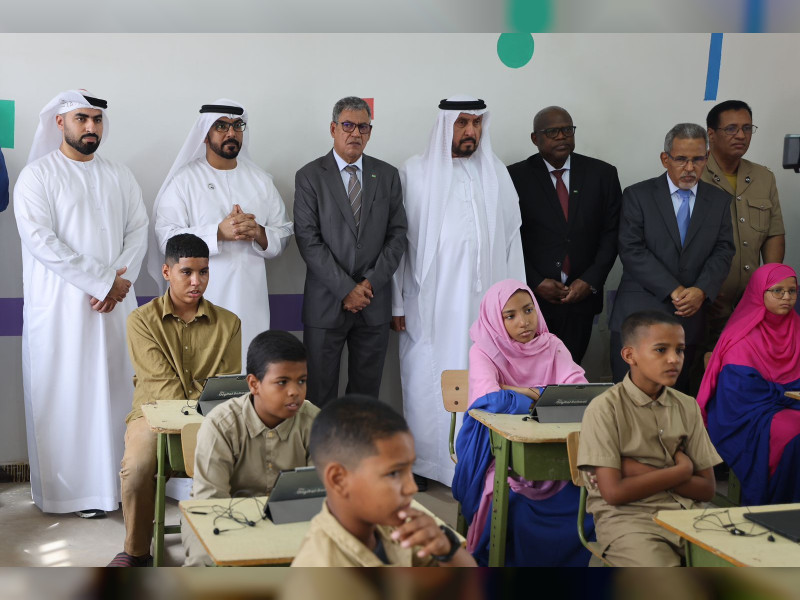
Additionally, it was announced that 66 digital learning centres equipped with digital tools, computers, and internet access had been completed, significantly contributing to the facilitation of digital transformation in education. These centres were made possible, in part, by the generous contribution of 60 new digital learning centres from the Emirates Red Crescent. The centres are being equipped with approximately two thousand tablet devices to support the educational needs of students in Mauritania.
The Digital School’s pilot phase in Mauritania successfully activated six schools during the 2021-2022 academic year. This phase provided digital content and tablet devices, while teachers received training in digital teaching skills to enhance student interaction and provide a digital learning experience. Building on this success, a new agreement for joint collaboration was established in June 2022 to expand The Digital School project, with the goal of reaching 100,000 students and 1,000 teachers within three years.
The Digital School, launched in November 2020 as part of the Mohammed bin Rashid Al Maktoum Global Initiatives by His Highness Sheikh Mohammed bin Rashid Al Maktoum, aims to empower students in areas where suitable educational conditions or resources are lacking. It provides a quality option for remote learning, primarily targeting disadvantaged communities, refugees, and displaced persons through modern educational materials and curricula.
Currently, The Digital School serves over 50,000 students across eight countries, offering educational and training content in Arabic, English, French, and Spanish. Over 1,000 digital teachers have been trained as part of the programme.
المدرسة الرقمية تعكس رؤى محمد بن راشد لمستقبل التعليم والجيل المقبل للمنظومة التعليمية التي سترتكز على الحلول التكنولوجية والرقمية.
– إبراهيم فال محمد الأمين: توسيع تجربة المدرسة الرقمية لتشمل 60 مدرسة جديدة يستفيد آلاف الطلاب.
حمود الجنيبي: تسهيل وصول الطلبة إلى المحتوى التعليمي الرقمي المتقدم وتشجيعهم على التحصيل المعرفي.
دبي في 14 يونيو /وام/ افتتحت المدرسة الرقمية إحدى مبادرات محمد بن راشد آل مكتوم العالمية، 66 مركز تعلم رقمي جديد في الجمهورية الإسلامية الموريتانية، تم إنشاؤها بالتعاون مع الهلال الأحمر الإماراتي، ضمن مبادرات المدرسة الهادفة لتعميم مهارات وحلول التعليم الرقمي في المنطقة العربية.
جاء الإعلان إيذانا بانطلاق المرحلة الثانية من مبادرة المدرسة الرقمية في الجمهورية الإسلامية الموريتانية خلال زيارة رسمية الى الجمهورية الإسلامية الموريتانية، أجراها وفد المدرسة الرقمية الذي ضم سعادة حمود الجنيبي الأمين العام المكلف لهيئة الهلال الأحمر الإماراتي وعضو مجلس إدارة المدرسة الرقمية، والدكتور وليد آل علي أمين عام المدرسة الرقمية.
وهدفت الزيارة إلى الاطلاع على تطورات مبادرات المدرسة الرقمية في موريتانيا والتي تتم بالتعاون مع وزارة التهذيب الوطني وإصلاح النظام التعليمي في موريتانيا، وتعزيز دورها حيث تستهدف استقطاب 100 ألف طالب و تدريب 1000 معلم للاستفادة من برامج المدرسة الرقمية، وشهدت الزيارة عقد اجتماعات مع المسؤولين الحكوميين والشركاء الاستراتيجيين وبحث سبل دعم مبادرات المدرسة الرقمية وإنجاح مشاريعها، كما أجرى الوفد جولة ميدانية تابع من خلالها سير العمل في مراكز التعلم الرقمي وتجربة المعلمين والطلبة مع المدرسة الرقمية.
وأكد معالي عمر سلطان العلماء وزير دولة للذكاء الاصطناعي والاقتصاد الرقمي وتطبيقات العمل عن بعد، رئيس مجلس إدارة المدرسة الرقمية، أن المدرسة الرقمية تعكس رؤى صاحب السمو الشيخ محمد بن راشد آل مكتوم نائب رئيس الدولة رئيس مجلس الوزراء حاكم دبي رعاه الله، لمستقبل التعليم، والجيل المقبل للمنظومة التعليمية التي سترتكز على الحلول التكنولوجية والرقمية، كما تجسد توجهات سموه للمساهمة الفاعلة في بناء الأجيال الجديدة في المنطقة العربية وتمكينها بالعلوم والتكنولوجيا المتقدمة، لتسهم بدور فاعل في صناعة مستقبل أفضل للمجتمعات.
وقال عمر سلطان العلماء إن افتتاح 66 مركزاً جديداً للتعلم الرقمي في موريتانيا، يأتي بعد النجاح الكبير الذي حققته مراكز التعليم الرقمي الستة التي تم إطلاقها في المرحلة الأولى بالتنسيق مع وزارة التهذيب الوطني وإصلاح النظام التعليمي، وبالتعاون بين المدرسة الرقمية والهلال الأحمر الإماراتي، في تأهيل وتدريب المعلمين الرقميين، وتطوير المناهج الرقمية، واستقطاب طلاب المدارس للتسجيل ببرامج المدرسة، التي نسعى إلى أن يبلغ أثرها الإيجابي 100 ألف طالب وألف معلم في موريتانيا.
وأشاد رئيس مجلس إدارة المدرسة الرقمية بحرص حكومة موريتانيا على تمكين الطلاب من تجربة تعليم متطورة تصل إلى الجميع حيثما كانوا، وتوفر لهم الفرص ليكتسبوا العلوم والمهارات والخبرات التي تدعمهم وتعزز دورهم في مواجهة تحديات المستقبل، وقيادة الجيل الجديد من الحكومات والاقتصادات.
من جهته، قال معالي إبراهيم فال محمد الأمين وزير التهذيب الوطني وإصلاح النظام التعليمي في الجمهورية الإسلامية الموريتانية: تجسيدا للتعاون المثمر بين بلادنا والمدرسة الرقمية، تمّ الاتفاق على انشاء المدرسة الرقمية في موريتانيا سنة 2021 وتمكّن هذا المشروع في مرحلته التجريبية الأولى من فتح 6 مراكز رقمية مجهّزة على مستوى 4 اعداديات ومدرستين ابتدائيتين لصالح 635 طالب، كما تمّ تكوين اثنيّ عشر مدرّسا في مجال التعليم الرقمية وثلاثة أعضاء من فريق العمل. وقد توّج هذا التكوين بحصول الفريق الوطني على شهادات من جامعة أريزونا وتوزيع 400 لوح الكتروني.
وأضاف: يهدف المشروع في مرحلته الثانية إلى توسيع هذه التجربة لتشمل 60 مدرسة جديدة يستفيد منها 20 ألف تلميذ في المرحلتين الابتدائية والاعدادية، كما سيتم تكوين 146 مدرسا وزيادة فريق العمل ان شاء الله.
من جهته، أكد سعادة حمود عبد الله الجنيبي الأمين العام المكلف لهيئة الهلال الأحمر الإماراتي، حرص الهيئة على دعم مثل هذه المبادرات النوعية، التي تحدث أثرا إيجابيا مباشرا في المجتمعات النامية، وتعزز مجالات التنمية البشرية والإنسانية، لذلك تولي هيئة الهلال الأحمر التعليم وتوفير فرصه للجميع اهتماما كبيرا.
وأضاف: شراكتنا مع مؤسسة مبادرات محمد بن راشد آل مكتوم العالمية في مشروع المدرسة الرقمية في موريتانيا وفي عدد من الدول الأخرى، تهدف لتسهيل وصول الطلبة إلى المحتوى التعليمي الرقمي المتقدم، وتشجيعهم على التعلّم والتحصيل المعرفي، وتخطّي التحديات، ومحاربة التسرب المدرسي، إلى جانب إثراء المحتوى الإلكتروني، ودعم التعليم الذي يعزز التنمية ويشكل أساساً لاستقرار المجتمعات وتقدمها وازدهارها.
وقال الجنيبي إن افتتاح 66 مركزا للمدرسة الرقمية في موريتانيا يعتبر انجازا كبيرا وخطوة متقدمة في مجالات الشراكة القائمة بين الهلال الأحمر الإماراتي، ومؤسسة مبادرات محمد بن راشد آل مكتوم العالمية، بهدف تنسيق الجهود المشتركة لتحقيق أهداف المدرسة الرقمية، وتعزيز مساعي الجانبين لتحسين حياة سكان المناطق المستهدفة من المبادرة، وتوفير حلول مبتكرة وغير تقليدية للتحديات التي تواجه المجتمعات البشرية في المجالات الضرورية وعلى رأسها التعليم.
وأوضح أنه وفقاً للشراكة بين الجانبين يقوم الهلال الأحمر الإماراتي بالمساهمة في تحديد المناطق المستهدفة وتسهيل الوصول إليها وتقديم الدعم اللازم، خصوصاً في القرى والمناطق النائية التي تشملها أنشطة الهيئة، معتبراً أن هذه الشراكة تعد نموذجاً يحتذى في التعاون والتناغم والعمل بروح الفريق الواحد بين المؤسسات الإماراتية العاملة في المجال الإنساني والتنموي، نظراً لاهتمامها بإكساب الفئات المستهدفة المعارف والمهارات اللازمة لتحسين حياتها إلى الأفضل بشكل مستدام مهما كانت التحديات.
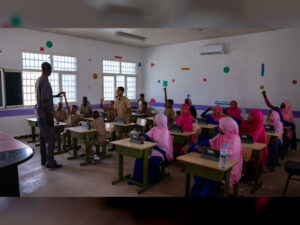
– إطلاق المرحلة الثانية للمدرسة الرقمية.
واحتفت حكومتا الإمارات وموريتانيا بإطلاق المرحلة الثانية للمدرسة الرقمية في موريتانيا، في فعالية تم تنظيمها في قصر المؤتمرات في العاصمة نواكشوط بحضور معالي إبراهيم فال ولد محمد الأمين وزير التهذيب الوطني وإصلاح النظام التعليمي، وسعادة حمد غانم المهيري سفير دولة الإمارات في موريتانيا، والوفد المرافق، وعدد من كبار المسؤولين الحكوميين.
وتم خلال الحفل التعريف بالمدرسة الرقمية ونتائج المرحلة الأولى من تدريب للمعلمين ورقمنة المحتوى التعليمي وتجهيز المنصة الرقمية للتعليم الخاصة في موريتانيا وتجهيز مساحات التعلم الرقمي والتي تشكل قاعدة صلبة لانطلاقة أكبر وأوسع، كما شهد الحفل تخريج الدفعة الأولى من برنامج تدريب المعلم الرقمي الذي نظمته المدرسة الرقمية بالتعاون مع جامعة ولاية أريزونا ووزارة التهذيب الوطني وإصلاح النظام التعليمي في موريتانيا، وتم تكريم فريق عمل المدرسة الرقمية في موريتانيا تحت إشراف الأستاذ لمام حمود ونخبة من المعلمين المتميزين. كما تم إعلان تجهيز 66 مركز تعلم رقمي مجهزة بالأدوات الرقمية والحواسيب والوصول للإنترنت ما يساهم في تمكين التحول الرقمي في التعليم.
– تجربة متميزة.
وتمثل المرحلة التجريبية لمراكز التعلم الرقمي في موريتانيا تجربة متميزة، تم تفعيلها في ست مدارس في العام الدراسي (2021-2022)، وتم خلالها توفير المحتوى الرقمي وأجهزة الكمبيوتر اللوحي (تابلت) وتدريب المعلمين على مهارات المعلم الرقمي بما يساهم في تعزيز التفاعل مع الطلاب وتوفير تجربة التعليم الرقمي لهم، وتبع هذه التجربة الناجحة توسيع التعاون في مشروع المدرسة الرقمية عبر اتفاقية جديدة للتعاون المشترك في يونيو 2022، تهدف للوصول إلى 100 ألف طالب وألف معلم خلال 3 سنوات.
وتمكنت المدرسة الرقمية بالتنسيق مع وزارة التهذيب الوطني وإصلاح النظام التعليمي في موريتانيا من تطوير خطط الدروس والمصادر التعليمية الرقمية لمواد العلوم والرياضيات لصفوف السادس والسابع على منصة المدرسة الرقمية الخاصة في موريتانيا، وبما يوافق المنهاج الموريتاني، فيما يجري العمل على تطوير خطط الدروس لمواد العلوم والرياضيات وغيرها من المواد الأساسية والإثرائية لصفوف الخامس والثامن.
و تم تسجيل عشرين ألف طالب في نظام التعلم الرقمي للمدرسة الرقمية في موريتانيا بحيث يستطيع الطلبة الاستفادة من المحتوى الرقمي والخدمات الرقمية للمدرسة الرقمية، فيما تم تدريب وتخريج 15 معلما رقميا للمرحلة الأولى من خلال برنامج تدريبي خاص بالتعاون مع جامعة ولاية اريزونا، ويجري تدريب 146 معلما رقميا في دفعة جديدة للمرحلة الثانية من مراحل بناء قدرات المعلمين الرقميين.
– 66 مركز تعلم رقمي.
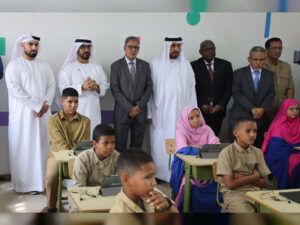
و أسهمت هيئة الهلال الأحمر الإماراتي في تجهيز 60 مركز تعلم رقمي جديدا، ليصبح العدد الإجمالي لمراكز التعلم الرقمي 66 مركزا في موريتانيا، يتم العمل على تزويدها بنحو ألفي جهاز كمبيوتر لوحي لخدمة الطلاب في موريتانيا.
الجدير بالذكر ، أن المدرسة الرقمية، التي أطلقها صاحب السمو الشيخ محمد بن راشد آل مكتوم نائب رئيس الدولة رئيس مجلس الوزراء حاكم دبي رعاه الله، في نوفمبر 2020 ضمن مؤسسة مبادرات محمد بن راشد آل مكتوم العالمية، تعد أول مدرسة رقمية متكاملة من نوعها، وتهدف إلى تمكين الطلاب بخيارات التعلم الرقمي في المناطق والأقاليم التي لا تتوفر فيها الظروف الملائمة أو المقومات التي يحتاجها الطلاب لمتابعة تعليمهم، كما توفر خياراً نوعياً للتعلم المدمج و التعلم عن بُعد، بطريقة ذكية ومرنة ، مستهدفة بالدرجة الأولى الفئات المجتمعية الأقل حظا واللاجئين والنازحين، عبر مواد ومناهج تعليمية عصرية.
وتواصل المدرسة الرقمية توسعها وتحقيق مستهدفاتها حيث ضمت أكثر من 50 ألف طالب من 8 دول هي الأردن، مصر، العراق، موريتانيا، لبنان، كولومبيا، وبنغلاديش، وأفغانستان، وعملت على تدريب أكثر من 1000 معلم رقمي، فيما يتم توفير المحتوى التعليمي والتدريبي بأربع لغات هي العربية والإنجليزية والفرنسية والإسبانية.








